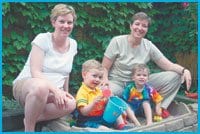
2001 Credit: Christine Ablett
On Sat, Jun 25 Dyke March founding mothers Lesha Van Der Bij and Lisa Hayes will be leading the way once again as this year’s honorees. Ten years later, they say they both still remember their apprehension at that first event.
“The march had prompted so much controversy,” recalls Van Der Bij. “Would this divide the community? We didn’t know. On top of it, the weather was bad. It was like hosting a party; we had no idea if anyone would come.”
It was a wildly rainy day on Jun 29, 1996. Van Der Bij and her friend Hayes had a single pickup truck with one mic and Elvira Kurt to entertain the masses they were hoping for.
“I’d never done anything like this,” says Van Der Bij. “I was almost completely closeted before and here I am, soaking wet, setting up for a public dyke event.
“We were easily an hour late. The cops were annoyed and then surprised as they saw women arriving in groups. News about [the march] had got around by word of mouth. It was totally grassroots. It was elating.”
The police had predicted there would be less than 50 participants and were requiring them to stay on the sidewalk instead of letting them take over the street. There were a total of four volunteers and a budget of just $50. Advertising had consisted of a few surreptitiously copied flyers and a lot of talking it up. Despite the DIY marketing, the idea had sparked a lot of interest.
“The march was an effective antidote of sorts to the daily invisibility that lesbians inevitably feel living in a hetero-dominated world,” says Hayes.
All told more than 5,000 hot wet dykes turned up out front of the 519 Community Centre, raring to go. The original route headed north on Church St, east on Bloor St and then south on Sherbourne St, a route dictated by police after they refused to issue a street closure permit for Yonge St.
The march ran into trouble when residents in some of the high-rise buildings on Sherbourne St pelted marchers with bottles and food. It only made the crowd louder, stronger. Marchers in the crowd yelled up at the aggressors and kept on dancing.
Homophobia directed at the marching women wasn’t the only challenge that first year. When Hayes and Van Der Bij had first put out the word, there was an intense reaction against it from many queers. Angry letters of protest about the exclusion of men came in from all sectors, arguing that the march would divide the movement.
“I was really surprised by the intensity of the negative feeling that was aroused by this plan to have a Dyke March,” says Hayes. “I thought the fact that Pride and the gay village were male-dominated spaces was so obvious that the need for a Dyke March would be readily apparent to all in the community. The most surprising opposition came from some lesbians… whose argument went, ‘We’re all marginalized as a community and we need to stick together.'”
Despite the continued success of the Dyke March – participation peaked at an estimated 20,000 last year – the issue of exclusion has remained controversial. Last year, Pride’s Dyke March Committee set a policy welcoming “dyke-identified trans people” in an attempt to address both FTM and MTF inclusion. The most recent debate has been over the inclusion of supportive dads in the march.
Hayes says the event’s continued popularity indicates it “clearly meets a need within the community.” Despite all of the naysayers’ doomsday expectations, Hayes believes that the Dyke March has “made Pride as a whole more inclusive.”
On the other hand, Van Der Bij says she feels increasing ambivalence about maintaining a women-only march now that she can foresee a day when her son will be too old to be involved. She says when that day comes she’ll likely watch from the sidelines, but expects a period of discomfort.
“I principally believe in having a dyke-only space but, as a mother, I won’t want to be active in something that excludes my son.”
These days, both women are focussing their energies on family and legal careers. Van Der Bij and her partner are the proud parents of a two-year-old son; she is expecting her second child in September. She practises law. Coincidentally Hayes is mother to a two year old as well, and provides legal counsel for Children’s Aid Society.

 Why you can trust Xtra
Why you can trust Xtra


